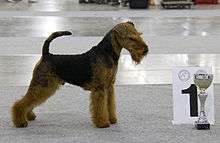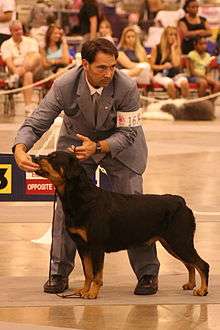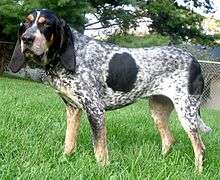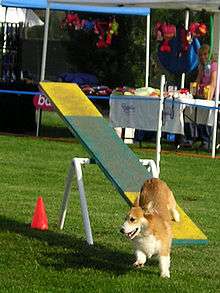American Kennel Club
 | |
| Abbreviation | AKC |
|---|---|
| Formation | 1884 |
| Type | Kennel club |
Region served | United States |
Official language | English |
| Website |
www |
The American Kennel Club (AKC) is a registry of purebred dog pedigrees in the United States. In addition to maintaining its pedigree registry, this kennel club also promotes and sanctions events for purebred dogs, including the Westminster Kennel Club Dog Show, an annual event which predates the official forming of the AKC, the National Dog Show, and the AKC/Eukanuba National Championship. Unlike most other countries' kennels clubs, the AKC is not part of the Fédération Cynologique Internationale (World Canine Organization).
History
The origins of the AKC lay in the National Greyhound Association, which was the first organization to encourage breeders to produce dogs with a goal in mind.[1] In this case, the goal was not beauty but racing speed.[1] In 1882, the National Coursing League, a British organization, began to require that all racing dogs be registered in their studbooks before they were eligible to race.[1] The National Greyhound Association followed suit soon after.[1]


In the early 1800s, the English became concerned with the beauty of dogs rather than their function.[1] This fad spread to North America, and in 1877, the Westminster Kennel Club Dog Show began.[1] Soon after, the need for a regulating body became obvious. The National American Kennel Club, which had been founded in 1876, began to publish and make publicly available its studbook in 1879.[1] This organization, however, had a more vested interest in field trials than in conformation shows, and eventually changed its name to the National Field Trial Association and stopped hosting conformation shows completely.[1]
In 1884, a group of 13 breed clubs, 10 American clubs and 3 Canadian clubs, founded the American Kennel Club.[1] These 13 clubs pledged "to do everything to advance the study, breeding, exhibiting, running and maintenance of purity of thoroughbred dogs."[2] The AKC differed from The Kennel Club in that individuals could not directly join the Kennel Club; they became members of smaller, individual breed clubs, which were themselves members of the AKC.[1] When arguments began to develop between the American and Canadian breed clubs in 1886, the Canadian clubs pulled out from the organization and established their own kennel club two years later, the Canadian Kennel Club.[1]
In 1894, the American Kennel Club began to refuse to allow Canadian dogs without an American pedigree to participate in its shows, following the prevailing trends in American purebred cattle organizations.[1] In 1906, the US Department of Agriculture ruled that any dogs imported to America who were not registered with the AKC would have to pay a duty charge; this was later changed in 1911, allowing any dog registered with a kennel club in its home country duty-free entry into the country.[1] Soon after the AKC, CKC, and KC produced agreements that made any dog eligible to be registered with the club in its home country, eligible for registration in the remaining two clubs as well.[1] In 1909, the group moved to New York and became incorporated.[1]
On July 1, 2012, the AKC began to recognize certain titles issued by the North American Flyball Association. These titles are Flyball Champion (FDCh), Flyball Master (FM), and the ONYX title.[3]
Registration

The AKC is the largest registry of purebred dogs in the U.S., and is the only not-for profit registry, as well as the most well-known, and the most influential.[2] For a purebred dog to be registered with the AKC, the dog's parents must be registered with the AKC as the same breed, and the litter in which the dog is born must be registered with the AKC. If the dog's parents are not registered with the AKC or the litter is not registered, an exception may be made if the AKC determines, through special registry research, that the dog is eligible for AKC registration. Once a determination of eligibility is met, either by litter application or registry research, the dog can be registered as purebred by the AKC.[4] Registration indicates only that the dog's parents were registered as one recognized breed; it does not necessarily indicate that the dog comes from healthy or show-quality blood lines, nor is registration necessarily a reflection on the quality of the breeder or how the puppy was raised.[5][6]
Recognized breeds

As of November 2016, the AKC recognizes 202 breeds.
The AKC divides dog breeds into seven groups, one class, and the Foundation Stock Service, consisting of the following (as of January 2011):
- Sporting Group: 30 breeds; developed as bird dogs. Includes Pointers, Retrievers, Setters, and Spaniels.[7]
- Hound Group: 29 breeds; developed to hunt using sight (greyhounds) or scent (Beagle).[8]
- Working Group: 30 breeds; developed for a variety of jobs, including guarding property, guarding livestock, or pulling carts.[9]
- Terrier Group: 30 breeds; developed to hunt vermin and to dig them from their burrows or lairs.[10]
- Toy Group: 21 breeds; developed as companion dogs.[11]
- Herding Group: 29 breeds; developed to herd livestock.[12]
- Non-Sporting Group: 20 breeds; assorted breeds who do not fit into any of the above groups.[13]
- Miscellaneous Class: 11 breeds that have advanced from FSS but that are not yet fully recognized. After a period of time that ensures that good breeding practices are in effect and that the gene pool for the breed is ample, the breed is moved to one of the seven main groups.[14]
- Foundation Stock Service (FSS) Program: 65 breeds. This is a breed registry in which breeders of rare breeds can record the birth and parentage of a breed that they are trying to establish in the United States; these dogs provide the foundation stock from which eventually a fully recognized breed might result. These breeds cannot participate in AKC events until at least 150 individual dogs are registered; thereafter, competition in various events is then provisional.[15]
Shows
AKC/Eukanuba National Championship
The AKC/Eukanuba National Championship is an annual event held in Orlando, FL. The show is by invitation only. The dogs invited to the show have either finished their championship from the bred-by-exhibitor class or ranked in the Top 25 of their breed. The show can often be seen on major television stations.[16]
Activities

The AKC sanctions events in which dogs and handlers can compete. These are divided into three areas:
- Conformation shows
- Companion events, in which all registered and PAL/ILP dogs can compete. These include:
- Obedience trials
- Tracking trials
- Dog agility, including the specialized Fifteen and Send Time events
- Rally obedience
- Performance events, which are limited to certain entrants; PAL/ILP dogs of the correct breed are usually eligible:
- Coonhound events (coonhounds; no PAL/ILP dogs)
- Field trials (hounds)
- Earthdog trials (small terriers and Dachshunds)
- Sheepdog trials (herding tests) (herding breeds, Rottweilers, and Samoyeds)
- Hunt tests (most dogs in the Sporting Groups and Standard Poodles)
- Lure coursing (sighthounds only)
Other programs
The AKC also offers the Canine Good Citizen program. This program tests dogs of any breed (including mixed breed) or type, registered or not, for basic behavior and temperament suitable for appearing in public and living at home.
Another AKC affiliate is AKC Reunite,[17] formerly AKC Companion Animal Recovery (AKC CAR), founded in 1995, is North America’s largest not for profit pet ID and recovery service.
Another AKC affiliate is the AKC Humane Fund [18] which supports breed Rescue activities, assists shelters that permit domestic violence victims to bring their pets and educates dog lovers about responsible dog ownership.
Criticism and Controversy
Genetics
The AKC has been criticized for the prevalence of genetic disorders in their dogs. As many as 25% of purebred dogs registered by the AKC has at least one hereditary genetic problem.[2] These problems cost breeders and owners almost $1 billion in vet bills and lost revenues from stillborn pups.[2] Some breed clubs, such as the U.S. Border Collie Club, resisted applying for AKC breed acceptance due to fears that doing so would be detrimental to the genetics of the breed they represent.[2][19] The Cavalier King Charles Spaniel Club voted to reject AKC recognition in May 2000 due to the incompatibility of the breed club's no-sales-to-pet-stores rule, and the kennel club's requiring such sales.[2] The breed club had such a rule to aid in the genetic health of the breed.[2][20]
These genetic issues have resulted in the emergence of "puppy lemon laws" in several US states.[2] These laws protect dog owners from genetic diseases that their breeder may have neglected to inform them of, allowing them to get a refund for the cost of the puppy or to force the breeder to pay their vet bills.[2]
Health
The AKC supports some canine health research, and has run advertising campaigns implying that the AKC is committed to healthy dogs, but the AKC's role in furthering dog health is controversial. Temple Grandin maintains that the AKC's standards only regulate physical appearance, not emotional or behavioral health.[21] The AKC itself states that "There is a widely held belief that "AKC" or "AKC papers" guarantee the quality of a dog. This is not the case. AKC is a registry body. A registration certificate... in no way indicates the quality or state of health of the dog."[22]
The AKC has no health standards for breeding; the only breeding restriction is age (a dog can be no younger than 8 months).[23] Though the majority of the 170 breed-specific parent clubs have a health committee devoted to their breed's specific concerns, the AKC prohibits clubs from imposing stricter regulations since the AKC Rules Applying to Registration and Discipline[23] apply to all breed clubs and do not provide an option for breed clubs to extend or override them. Thus, an AKC breed club cannot require a higher breeding age, hip dysplasia ratings, genetic tests for heritable diseases, or any other restrictions. Parent clubs have the power to define the looks of the breed, or breed standard and may also restrict participation in non-regular events or classes such as Futurities or Maturities to only those dogs meeting their defined criteria. These non-regular events can require health testing, DNA sampling, instinct/ability testing, and other outlined requirements as established by the hosting club.
In summary, attention to health among breeders is voluntary and not mandated. By contrast, many dog clubs outside the US do require health tests of breeding dogs. The German Shepherd Club of Germany,[24] for example, requires hip and elbow X-rays in addition to other tests before a dog can be bred.[25] Such breeding restrictions are not allowed in AKC member clubs. As a result, some US breeders have established parallel registries or health databases outside of the AKC; for example, the Berner Garde[26] established such a database in 1995 after genetic diseases reduced the average lifespan of a Bernese Mountain Dog to 7 years. By comparison, the Swiss Bernese Mountain Dog Club introduced mandatory hip X-rays in 1971.[27]
For these, and other reasons, a small number of breed clubs have not yet joined the AKC so they can maintain stringent health standards, but, in general, the breeders' desire to show their dogs at AKC shows such as the Westminster Dog Show has won out over these concerns. Concern surrounding the AKC’s connections to low-quality breeders has resulted in some dog owners seeking to distance themselves from the organization. In October 2012, Hailey Parker, a longtime Coton de Tulear breeder, filed a lawsuit against the AKC and cited the AKC’s connections with high-volume breeders among the reasons.[28] The Coton’s “reputation and business model is based on a disassociation from ‘puppy mills’ and similar commercial breeding operations,” according to the complaint.
The Club has also been criticized for courting large scale commercial breeders[29][30] and for lax enforcement of breeding regulations. The AKC employs just 9 field inspectors[28] and critics argue that its inspections are ineffective. For example, the owner of a Montana malamute kennel approved by AKC inspectors in 2008 and 2009 was sentenced to five years in prison for animal cruelty in operating that kennel.[28] Similarly, an AKC inspector found a North Carolina kennel “in compliance with AKC’s Care Conditions Policy” three months before county officers raided the facility and found the dogs in “poor” condition, suffering from illnesses, injuries and living in “unhealthy conditions,” according to court documents. A veterinarian told the court that the rescued dogs had ailments that ranged “from serious to severe” and that “most of the injuries appeared to be chronic, having been in existence for a substantial period of time.”[28]
Similarly, the Humane Society of the United States criticized the AKC for not taking a stand against puppy mills.[31] According to the Humane Society's report, "over the past five years, AKC has opposed more than 80 different state bills and local ordinances designed to provide stronger protections for dogs in puppy mills".[32]
The AKC does support several health research initiatives. The AKC Canine Health Foundation funded research that led to the mapping of the canine genome (DNA sequence) with grants totaling more than $2 million. Sequencing of the dog genome began in June 2003, funded in large part by the National Human Genome Research Institute (NHGRI) and finished the completed sequence of the entire dog genome at MIT’s Broad Institute in 2005.[33] Because people inherit many of the same diseases as dogs, humans can also benefit from health research funded for dogs.
The Orthopedic Foundation for Animals (OFA) and the AKC Canine Health Foundation have established the Canine Health Information Center (CHIC) to encourage health testing by breeders and provide breeders and researchers with information to improve breeding programs. More than 135 different breeds have specific health testing pre-requisites required by their parent breed club.[34]
Lobbying
The AKC tracks all dog related legislation in the United States, lobbies lawmakers and issues legislative alerts on the internet asking for citizens to contact public officials. They are particularly active in combating breed-specific legislation such as bans on certain breeds considered dangerous. They also combat most legislation to protect animals such as breed-limit restrictions and anti-puppy mill legislation.[35][36]
See also
- John Emms (artist)
- List of dog breeds
- List of Kennel Clubs by Country
- United Kennel Club
- Dogs in the United States
Notes
- 1 2 3 4 5 6 7 8 9 10 11 12 13 14 15 Margaret E. Derry (October 7, 2003). "Producing Beautiful Dogs". Bred for Perfection: Shorthorn Cattle, Collies, and Arabian Horses Since 1800. JHU Press. pp. 48–. ISBN 978-0-8018-7344-7. Retrieved June 20, 2013.
- 1 2 3 4 5 6 7 8 9 Lemonick, Michael D. (June 2001). "A Terrible Beauty". TIME Magazine.
- ↑ "First Things". Dog World. 97 (9): 10. September 2012.
- ↑ American Kennel Club, Dog Registration FAQ, AKC.org, Accessed June 8, 2009.
- ↑ Rossen, Jeff; Patel, Avni (May 1, 2013). "AKC-registered breeders raising dogs in 'miserable' conditions". Rossen Reports. NBC. Retrieved June 20, 2013.
- ↑ Pilon, Mary; Craig, Susanne (February 9, 2013). "Safety Concerns Stoke Criticism of Kennel Club". The New York Times. The New York Times Company. Retrieved June 20, 2013.
- ↑ "Sporting Group". American Kennel Club. Retrieved June 20, 2013.
- ↑ "Hound Group". American Kennel Club. Retrieved June 20, 2013.
- ↑ "Working Group". American Kennel Club. Retrieved June 20, 2013.
- ↑ "Terrier Group". American Kennel Club. Retrieved June 20, 2013.
- ↑ "Toy Group". American Kennel Club. Retrieved June 20, 2013.
- ↑ "Herding Group". American Kennel Club. Retrieved June 20, 2013.
- ↑ "Non-sporting Group". American Kennel Club. Retrieved June 20, 2013.
- ↑ "Miscellaneous Class". American Kennel Club. Retrieved June 20, 2013.
- ↑ "Foundation Stock Service". American Kennel Club. Retrieved June 20, 2013.
- ↑ "AKC/Eukanuba National Championship". Archived from the original on October 9, 2007. Retrieved October 4, 2007.
- ↑ "Pet Microchip Registration & Lost Pet Recovery - AKC Reunite". akcreunite.org.
- ↑ "AKC Humane Fund". AKC Humane Fund. Archived from the original on September 29, 2015.
- ↑ Donald McCaig (January 1, 2007). The Dog Wars: How the Border Collie Battled the American Kennel Club. Outrun Press. ISBN 978-0-9794690-0-8. Retrieved June 20, 2013.
- ↑ Mark Derr (April 1, 2004). Dog's Best Friend: Annals of the Dog-Human Relationship. University of Chicago Press. pp. 197–198. ISBN 978-0-226-14280-7. Retrieved June 20, 2013.
- ↑ Grandin, Temple; Johnson, Catherine (2005). Animals in Translation. New York, New York: Scribner. p. 82. ISBN 0-7432-4769-8.
- ↑ "About Registration". American Kennel Club. Archived from the original on May 14, 2011. Retrieved April 5, 2011.
- 1 2 Rules Applying to Registration and Discipline
- ↑ "Home". schaeferhunde.de.
- ↑ Verein für Deutsche Schäferhunde (SV) e.V.: Bekämpfung von HD + ED
- ↑ Bernergarde.org
- ↑ KBS - 2. Massnahmen
- 1 2 3 4 Pilon, Mary; Craig, Susanne (February 9, 2013). "Safety Concerns Stoke Criticism of Kennel Club". New York Times.
- ↑ Thedogpress.com
- ↑ Newsday.com
- ↑ "AKC Fails to Take a Stand Against Puppy Mills". humanesociety.org.
- ↑ "The American Kennel Club: No longer 'The Dogs's Champion'" (PDF). Retrieved 7 October 2015.
- ↑ "Dog Genome Project". broadinstitute.org.
- ↑ Caninehealthinfo.org, Canine Health Information Center, CHIC Breeds. Accessed March 16, 2011.
- ↑ American Kennel Club. "Mission Statement". akc.org.
- ↑ AKC.org